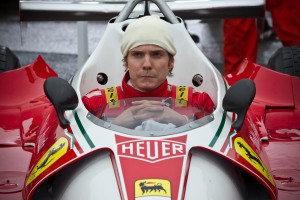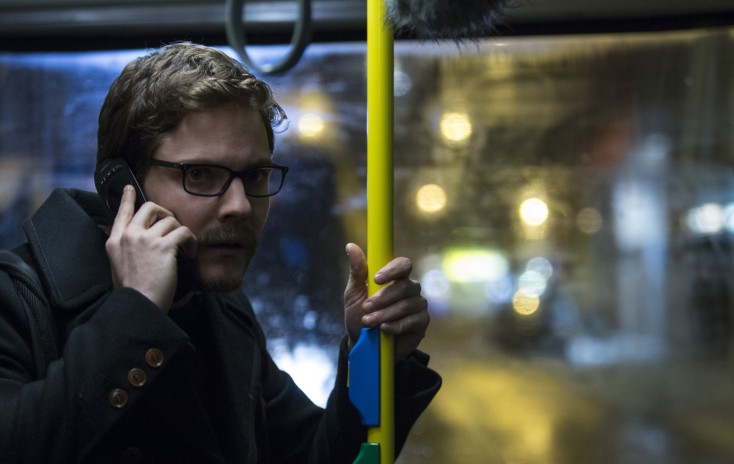
DANIEL BRÜHL stars as disciplined Austrian perfectionist Niki Lauda in “Rush.” ©Universal Studios. CR: Jaap Buitendijk.
By ANGELA DAWSON
Front Row Features
TORONTO—On the heels of his dead-on performance as racing legend Niki Lauda, Daniel Bruhl, a Spanish-born German actor, now portrays a pivotal character in “The Fifth Estate.”
As Daniel Domscheit-Berg, he serves the unenviable role as spokesman for WikiLeaks, the news leaking website that most notably revealed classified U.S. government intelligence documents. Bill Condon directs the political thriller, which stars Benedict Cumberbatch as WikiLeaks founder Julian Assange.
Bruhl recently spoke about his two big Hollywood movies and how he got into to skin of the real-life characters he depicts.
Q: This is your big year for you. Two fantastic and totally opposite kind of roles. Which did you do first?
Bruhl: “Rush” came first. It was strange to make two movies in a row in which I play real people.
Q: How early on were you aware that “The Fifth Estate” was going to be from your character’s perspective as opposed to being from Julian Assange’s perspective?
Bruhl: I didn’t know it when I received the script. I knew who Daniel was. Being a German, he was in the media a lot so it seemed to me that he’s a very reasonable, interesting guy. When I first heard about WikiLeaks couple of years ago, I was sure that sooner or later they’re going to make a movie about it. So it was strange to then participate in that project and play Daniel. It was very helpful to spend time with him. He invited me a couple of times to his place. He explained to me a lot about this intense relationship (he had) with Julian. But also about his future plans. I didn’t have any reason not to believe in his integrity. I had empathy with him. I share most of the opinions he has on things, so it was easy for me to portray him and like him.
Q: When you met him, what did you need to find out from him so that you could play him?
Bruhl: We focused on talking about (his) book. I wanted to know what the dynamic was like in his relationship and what this moment in life meant to him. I realized that this was probably the most significant moment in his life, and he was willing to do anything, as we see in the movie to support WikiLeaks.
Q: How available did Daniel make himself to you? I read that you spent four days with him. Did he answer all of your questions?
Bruhl: It’s difficult with these guys you know because he didn’t have a mobile phone number and he had a strange email address. (He laughs.) So it was hard. He doesn’t live in Berlin anymore. He lives an hour away in a house. I visited him there and then we were having a conversation in the kitchen. All of the sudden two pale guys came inside and spoke French and I said, “Who are they?” He said “They’re two French activists, IT guys who are working on the upper floor.” So he has a whole floor, which is fully equipped with computers. He would invite activists that he likes over and they stay there for free and just work. So that was my first impression—he’s a true activist. He hasn’t stopped after that painful experience with WikiLeaks. He goes on, and I admire that. I love playing characters that I partly envy because I also have a political conscience, but I was never that active. I didn’t know how to do it. It’s a problem of our generation, I guess. It was easier back in the days of my parents’ generation. They went to rallies and to demonstrations and you had clearer enemies. Today it all is a bit blurry. That’s what the movie’s about, too—how we perceive information of how we should oppose and so forth.
Q: Was their relationship akin to a bromance?
Bruhl: I always liked that structure. In a way it’s similar to (the relationship between the two men in) “Rush.” I like these movies where it’s not the typical thing. You have the villain and the good guy, and you only have empathy with one character. But with (“Rush” and “The Fifth Estate”) you eventually have empathy with both. I found that quite interesting. That’s another parallel. It doesn’t make a final judgment. It’s quite neutral in a way. I found it very interesting and a good idea to give Julian Assange the last word.
Q: What did you make of his relationship with Assange? Was Daniel kind of a slave to him?
Bruhl: Oh no. If you read all these different books you also will understand. If you read the unauthorized biography about Julian Assange, you’ll also understand where his paranoia comes from. It would be too easy to talk about masters and slaves, and villains and heroes. It’s far too complex. It was a very ambivalent and difficult relationship they had.
Q: But he was so terrible. He was just insulting and degrading and never gave him credit for anything.
Bruhl: Yeah, but I guess he admired him. Daniel just loved the idea behind WikiLeaks and found it very important so on a personal level, he is a very patient, reasonable man. He could cope with you know some inner conflicts that they had for the greater purpose.
Q: How did you get your start? Did you always want to act?
Bruhl: Yeah, I guess so. I did theatre at school. My mom told me that by the age of three or four I did very mean things. I loved to pretend that I’m dead. And I was very professional in doing so. (There was one time when I was) in a bathtub with a hair dryer when I was four (pretending to be dead). I don’t remember it but my mom said I always wanted to get attention and make up dramatic things.
Q: You were quoted in the New York Times saying that it would have been unusual 10 years ago for a German actor to get these kind of meaty Hollywood movie roles.
Bruhl: Thanks to people like Quentin (Tarantino). That was the first experience for me (in seeing German actor Christoph Waltz) in “Inglourious Basterds.” I heard that some of the American stars wanted to play certain parts in the movie and Quentin said, “No, no, no. I just wanted to make it different and give German actors the opportunity to play Germans.” I found that very clever. It’s also nice to see the Americans are coming over to Europe, to Germany, to Berlin to shoot their movies. Not only because of tax reasons but also because of the facilities and the professional crews we have, and the content of the story. I find it very positive that if you are a European actor or Asian or African, you should try and find actors who are actually from there. That makes cinema very interesting because you discover people that you didn’t know before. It gives us great opportunities, I hope.



